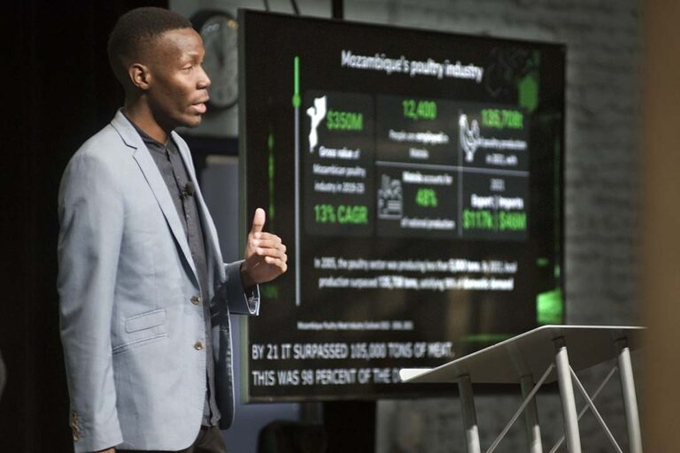June 3, 2025 | 19:38 GMT +7
June 3, 2025 | 19:38 GMT +7
Hotline: 0913.378.918
June 3, 2025 | 19:38 GMT +7
Hotline: 0913.378.918

The Green Poultry Farm solution aids in addressing both planetary boundaries and sustainable development goals.
The Wege Prize is an annual competition that “ignites game-changing solutions for the future by inspiring college/university students worldwide to collaborate across institutional, disciplinary, and cultural boundaries to redesign the way economies work”.
The Green Poultry Farm is an innovative biodigester system that transforms poultry litter into biogas and biofertilizers through anaerobic digestion. By converting the biogas into electricity and heat, the energy needs within poultry production are met. With that, the biofertilizer is used to grow feed for the poultry.
The aim is to cut poultry production costs by 30%, reducing the dependency on on-grid electricity during poultry production, and crop production costs by 22%, reducing the dependency on the import of fertilisers. This contributes to the circular economy, carbon capture, and helps to create jobs.
While initially implemented at local level in Mozambique, where there is a pressing need to manage poultry waste properly, we see how this concept can be used beyond our borders.
Green Poultry Farm’s stand-apart solution uniquely reduces the environmental impact of poultry farming through its circular design that keeps pollutants in the loop. The solution aids in addressing both planetary boundaries and sustainable development goals. Generally, the biogas produced in common anaerobic digesters comprises approximately 50-70% methane and 30-50% carbon dioxide – 2 greenhouse gases that contribute to climate change, along with trace amounts of hydrogen sulfide, and ammonia, nitrogen oxides, and water vapor.
To be considered a viable fuel source, it is necessary to minimise the carbon dioxide and hydrogen sulfide content in Green Poultry Farm’s biogas. This is because carbon dioxide acts as a diluent in the biogas, reducing methane concentration and decreasing the biogas mixture’s overall heating value. Typically, carbon dioxide and hydrogen sulfide content are minimised in biogas through costly downstream processing methods.
Green Poultry Farm’s economical approach to removing carbon dioxide and hydrogen sulfide in our biogas uses biochar, a charcoal produced through a thermal process devoid of oxygen, called pyrolysis. Due to its porous structure and surface chemistry, biochar is highly effective in adsorbing and removing carbon dioxide and hydrogen sulfide, with Green Poultry Farm’s solution showing the biochar adsorbs a significant amount of carbon dioxide along with trace amounts of hydrogen sulfide and water vapor, effectively reducing the presence of greenhouse gas emissions.
Wege Prize’s international panel of judges recognised Green Poultry Farm because of how the system offers a real-world solution to the challenging global issue of poultry farm litter in a way that drives a regenerative, circular economy. By converting poultry litter into biogas, biofertilizers, and biochar, waste is reduced and the sustainability of poultry farming is improved, which promotes the circular economy’s concepts and principles that seek to eliminate waste and optimise resource use by designing closed-loop systems. The solution offers a fully integrated, actionable approach to managing poultry waste.
Yes, our first customer is a poultry farmer businesswoman, who is a member and former president of the Mozambique Poultry Industry Association. She has 2 poultry farms, and the Green Poultry Farm team is actively working on one of them located in Chiango, Maputo City, which can produce more than 5,000 chickens including free-range chickens and laying hens. Our biodigester is implanted in her farm and we are managing all the free-range and laying hen chicken waste, using it in our biodigester to produce biogas and biofertilizer used by local farmers. In this way, we create a circular business-to-business to society.
We are currently installing our second biodigester in another poultry farm for another businesswoman in Matola, Maputo Province, progressively scaling our activities.
Our vision includes expanding our operations to serve more communities, establishing strategic partnerships with key stakeholders, and contributing to the advancement of sustainable agriculture practices. Ultimately, we envision Green Poultry Farm as a catalyst for positive change, inspiring others to embrace sustainable farming methods and promoting a healthier, greener future.
We are currently searching for new biodigester designs to maximise the potential and utilisation and processing of poultry litter into biogas and biofertilizers. We also have recently been awarded funding and learning support by United Nations Development Programme and the government of Italy to scale our impact.
(PW)

(VAN) Vikas Rambal has quietly built a $5 billion business empire in manufacturing, property and solar, and catapulted onto the Rich List.

(VAN) Available cropland now at less than five percent, according to latest geospatial assessment from FAO and UNOSAT.

(VAN) Alt Carbon has raised $12 million in a seed round as it plans to scale its carbon dioxide removal work in the South Asian nation.

(VAN) Attempts to bring down the price of the Japanese staple have had little effect amid a cost-of-living crisis.

(VAN) Fourth most important food crop in peril as Latin America and Caribbean suffer from slow-onset climate disaster.

(VAN) Shifting market dynamics and the noise around new legislation has propelled Trouw Nutrition’s research around early life nutrition in poultry. Today, it continues to be a key area of research.

(VAN) India is concerned about its food security and the livelihoods of its farmers if more US food imports are allowed.